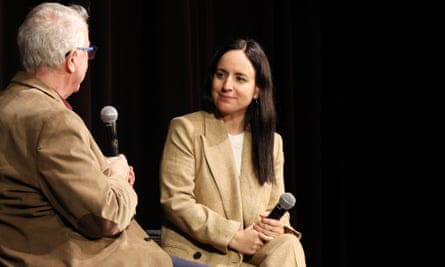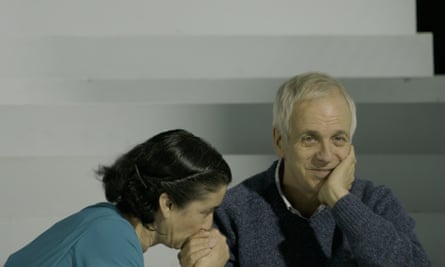At the start of the Chilean documentary The Eternal Memory, a woman asks her husband, who has Alzheimer’s, if he likes his life. He beams back at her. “I love life.” The couple will be instantly recognisable to audiences in Chile. He is Augusto Góngora, a journalist who was part of an underground television news service during the Pinochet dictatorship. Out on the streets he filmed the reality of life under military rule – at huge personal risk. The group’s bulletins, recorded on VHS tapes, were passed from house to house across the country. When Chile returned to democracy, Góngora became an influential figure on public television. His partner of 25 years, Paulina Urrutia, is a famous stage and screen actor. In 2014, aged 62, Góngora was diagnosed with Alzheimer’s. The Eternal Memory documents the pair’s final years together, as Urrutia becomes his full-time carer.
Surprisingly, it’s a tender and ultimately joyful portrait of a couple still madly in love. The film’s director, Maite Alberdi, nods, smiling. “Yes. It’s a story that is tragic on paper but not in reality. In the years I shot with them, I never left feeling sad.”
Alberdi is a documentary-maker. She met the couple in 2018, while giving a lecture to film students at a university where Urrutia was teaching theatre. A few months earlier Góngora had gone public with his Alzheimer’s diagnosis in a magazine interview. “It was very brave because he was the director of the public [television] channel. He quit and gave the interview, telling the whole country.”
That day at the university, what struck Alberdi was that Urrutia had brought Góngora to work with her – he’d become part of her routine, accepted and welcomed by her colleagues, who chipped in caring for him. “He was happy, and she was happy. They were being a couple, very normal.” There’s a scene in the film showing this: Urrutia rehearsing a play with Góngora by her side on stage, happy and smiling. The other actors are relaxed with the setup: one stops to kiss Góngora goodbye on the cheek as he leaves; another squats down for a chat.

In her previous documentaries, Alberdi has looked at the lives of people shut out by society. Her Oscar-nominated film The Mole Agent showed elderly people alone in a care home in their final years. Did seeing Góngora and Urrutia together feel like the opposite of that? “Yes. Completely. I’ve shot people with dementia before. I always saw them isolated from society. This was the first example of someone trying to be in society. It was unbelievable and very special. I was like: I need to make this love story.”
Góngora instantly agreed to be filmed. He wasn’t embarrassed or ashamed by his illness. He also felt that he owed it to people to share his experience. “He told Urrutia: ‘I’ve filmed so many people in my life. During the dictatorship people opened their doors to show me their fragility and pain. So why am I not going to open my doors to show my fragility?’” In old clips of his news broadcasts, his compassion and humour as a journalist practically glows on screen.
Urrutia was less keen, however, on the idea of a film. “And I completely agreed with her,” says Alberdi. As a prominent woman in Chile, Urrutia felt vulnerable to criticism. In 2006, she had been plucked from non-political life to become the country’s first culture minister. It took its toll. “When she was a minister, you’d see the interviews on television. It was like: Why don’t you have kids? Why are you prioritising that?” Alberdi pauses, outraged. “Are you really asking that question to a minister? How dare you!”
Together the couple made the decision to appear in the film. Alberdi’s plan was to show how they lived – “their social life, going to parties” – not hiding away Góngora’s illness. Alberdi has a young son, and says she learned from Urrutia how to be more upfront about her caring responsibilities. “Being a mum, before I met her, I was always hiding my domestic problems. ‘I can manage!’” Now she takes a leaf out of Urrutia’s book: “I say: ‘I’m with my son, but it’s OK. I’ll bring him.’”
Then, two years into filming, Covid hit. Santiago’s strict lockdowns meant Góngora had no visitors for a year and a half: “It was too risky.” During that time Urrutia took over camera duties, giving the film some of its most tender and upsetting moments – late at night, Góngora wandering in the dark, fretting, asking for his adult children (from a previous relationship). “It was a lesson in cinema,” admits Alberdi. “My whole career I was so concerned about the perfect shot, the perfect image. This is not that, but it’s so profound and intimate. I will never have that intimacy at 2am, with people alone in the middle of the night.”

The lockdown was tough on the couple: Urrutia caring for her husband alone, and Góngora deprived of company. “You can see it in the film. Before he was riding a bike and then he can almost not walk,” says Alberdi. “He lost his language after the pandemic.” His doctor told the family that he deteriorated in one month during the pandemic as much as had previously taken a year – “because he didn’t see people.”
Alberdi planned to film Góngora until he died. Instead, there was a moment – it’s in the film, after lockdown – when she decided to switch the camera off. Góngora turns to his wife and says: “I’m not myself any more.” Behind the camera, it was the first time Alberdi felt uncomfortable. “The day before he said: ‘I don’t want to live any more.’”
She pauses. “It was very clear for me that if he doesn’t want to live, then of course he doesn’t want to shoot. So that was my last day.” Góngora died in May aged 71, at home, cared for to the end by Urrutia. A few months earlier The Eternal Memory premiered at Sundance, winning the grand jury prize for world documentary.
I ask Alberdi what Urrutia thinks of the film, after her initial hesitance? “She is very grateful now. She said that the film is a gift for her.” In what way? “She never believed that it was going to be so, so … Augusto. She thought it was going to be more Alzheimer’s. But she feels it’s the film that Augusto would have made of himself. She feels him alive.”
After caring full-time for her husband in the later stages of his illness, Urrutia is travelling around the world to film festivals. “She said: ‘I came back to society with him taking my hand with the film.’ It’s how she wants to remember him.”
“She said too that it’s nice to share the mourning. That when someone you love passes away, nobody wants to speak to you about it. But she wanted to speak and the film is the best excuse to speak.”